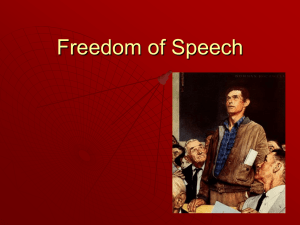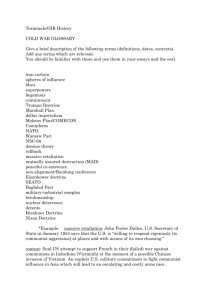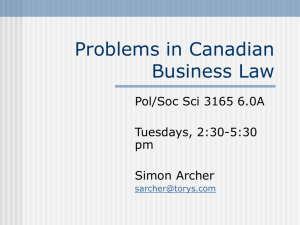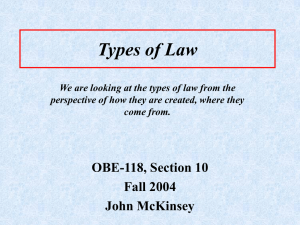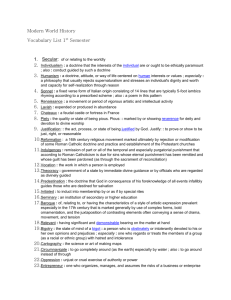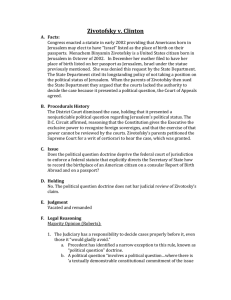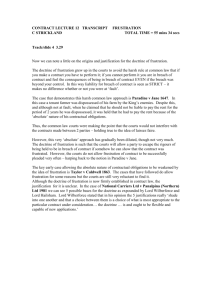Questions for discussion on 1/24/2006
advertisement
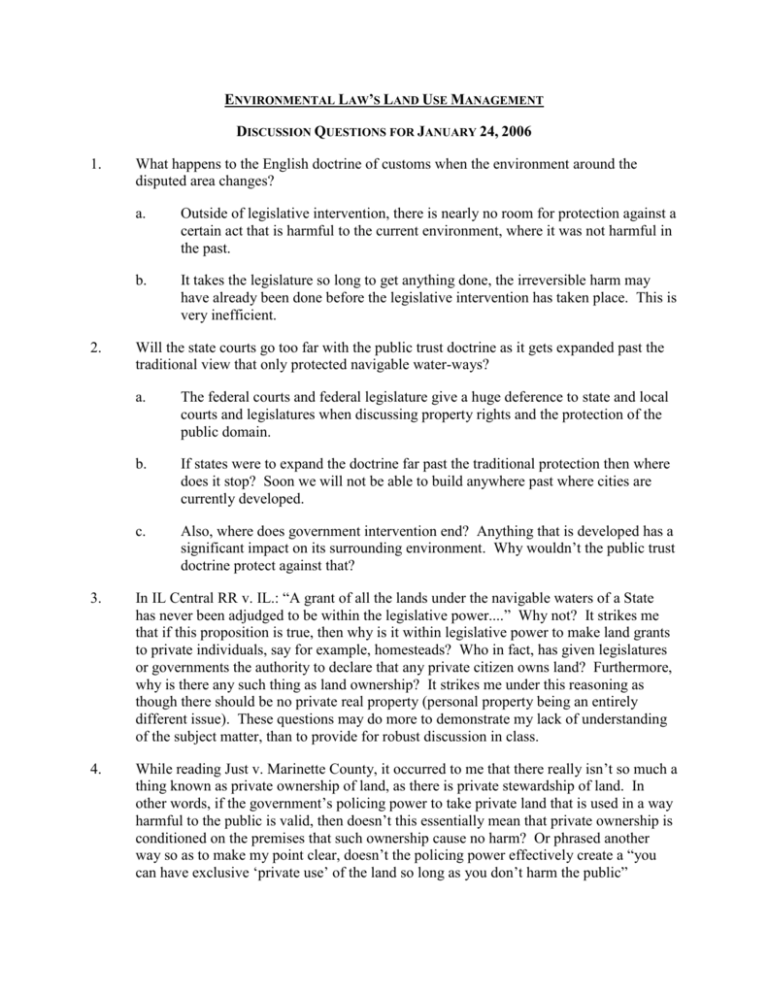
ENVIRONMENTAL LAW’S LAND USE MANAGEMENT DISCUSSION QUESTIONS FOR JANUARY 24, 2006 1. 2. What happens to the English doctrine of customs when the environment around the disputed area changes? a. Outside of legislative intervention, there is nearly no room for protection against a certain act that is harmful to the current environment, where it was not harmful in the past. b. It takes the legislature so long to get anything done, the irreversible harm may have already been done before the legislative intervention has taken place. This is very inefficient. Will the state courts go too far with the public trust doctrine as it gets expanded past the traditional view that only protected navigable water-ways? a. The federal courts and federal legislature give a huge deference to state and local courts and legislatures when discussing property rights and the protection of the public domain. b. If states were to expand the doctrine far past the traditional protection then where does it stop? Soon we will not be able to build anywhere past where cities are currently developed. c. Also, where does government intervention end? Anything that is developed has a significant impact on its surrounding environment. Why wouldn’t the public trust doctrine protect against that? 3. In IL Central RR v. IL.: “A grant of all the lands under the navigable waters of a State has never been adjudged to be within the legislative power....” Why not? It strikes me that if this proposition is true, then why is it within legislative power to make land grants to private individuals, say for example, homesteads? Who in fact, has given legislatures or governments the authority to declare that any private citizen owns land? Furthermore, why is there any such thing as land ownership? It strikes me under this reasoning as though there should be no private real property (personal property being an entirely different issue). These questions may do more to demonstrate my lack of understanding of the subject matter, than to provide for robust discussion in class. 4. While reading Just v. Marinette County, it occurred to me that there really isn’t so much a thing known as private ownership of land, as there is private stewardship of land. In other words, if the government’s policing power to take private land that is used in a way harmful to the public is valid, then doesn’t this essentially mean that private ownership is conditioned on the premises that such ownership cause no harm? Or phrased another way so as to make my point clear, doesn’t the policing power effectively create a “you can have exclusive ‘private use’ of the land so long as you don’t harm the public” standard? Nobody owns the land, but people can buy and exclusive “license” from the “public” to use the land in non-harmful ways. 5. Finally, the concept behind custom would seem to support this, especially here in the U.S. Although “our” system of laws is based heavily on the British system, shouldn’t we incorporate the customs of those people who occupied the land long before “we” arrived in the “new world”? 6. The Machiavellian doctrine of the ends justifying the means has permeated our treatment of land resources. The Act of 1869 granted in fee an enormous parcel of underwater land in Illinois to one of the most dominant industries of the time, the railroads. In Detroit’s Poletown area, the acquiescence to the wishes of General Motors (one of only three corporations to ever hold the position of No. 1 on the Forbes 500 list) displaced, perhaps needlessly, some 4200 people. Are the courts simply the handmaidens to corporate greed? 7. The only other two corporations to hold the #1 spot on the Forbes 500 list are ExxonMobil and (most recently ascending to that position) Wal-Mart. Have they prospered from the courts’ generosity? 8. If the Govt had decided not to repair the broken levy system in New Orleans and parts of the city had remained under water and inhabitable, would the lack of action on behalf of the Govt be considered a taking of the lands that remained under water? 2
